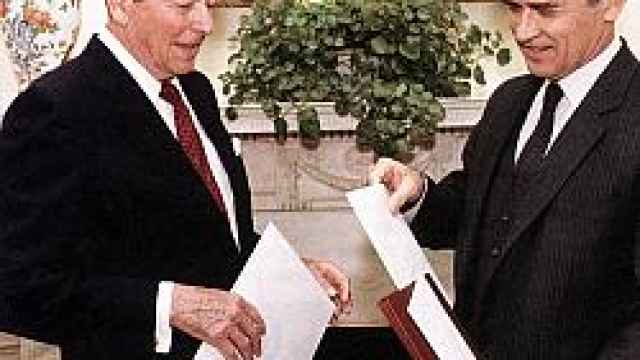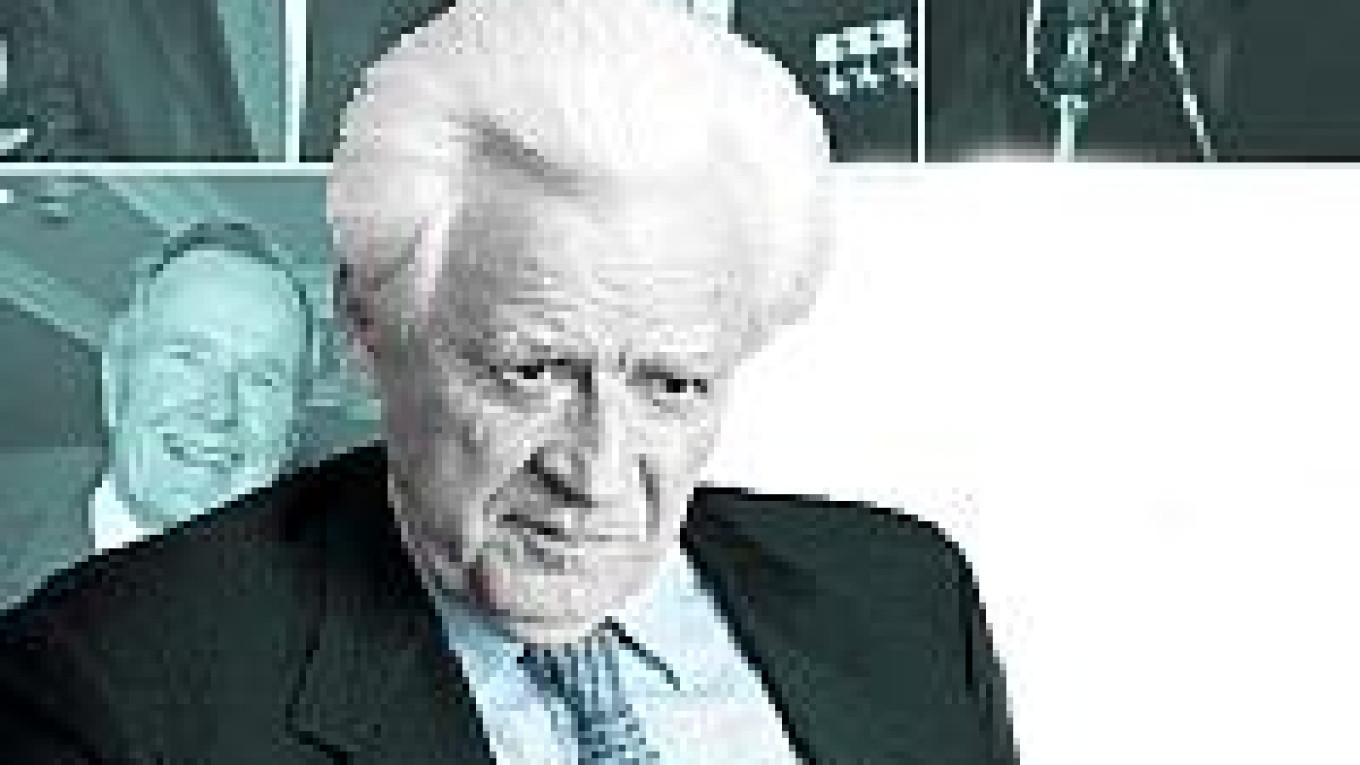The Malta Summit, as it became known, brought a chapter of world history to a close -- a chapter in which Dubinin played a supporting, if not starring role, serving as ambassador to France, Spain, the United States and Ukraine in a diplomatic career that stretched from 1954 to 1999. Under his watch, the broad spectrum of entente and detente unfolded between the Soviet Union and the United States, as the two superpowers rushed to the brink of nuclear war and back. Translating for Soviet Premier Nikita Khrushchev in Paris and negotiating arms reduction treaties with the Reagan administration, he gathered along the way an insider's view of that which most people only read about in history books -- as well as that which often gets left out.
"Fate gave me the gift of participating in many important events, but my role in history is small," he said humbly, squinting at his thumb and forefinger.
Now retired, Dubinin, 73, teaches at MGIMO, the Foreign Ministry's diplomatic academy and his alma mater. But he gets nostalgic when speaking about his former job, noting that an ambassador's calling forces one to put service ahead of self. "Diplomacy is the most beautiful profession. It's a calling that builds good relations between states and prevents war. And if wars appear, it stops them," he said.
Born in Siberia, Dubinin completed his university studies in 1954, the year after Josef Stalin's death. With French wars simmering in Indochina, he was shepherded into French-language training and sent abroad to study at the Sorbonne. Looking back, he takes mild offense at the suggestion that he was being groomed as a spy. "In the beginning, there was the Word," he said, quoting from the Bible in a broad stage voice, as if to convey the power of language and diplomatic tact.
After internships in Paris with the Soviet Embassy and UNESCO, Dubinin won a Foreign Ministry language competition and was appointed Khrushchev's translator for meetings in Paris with French President Charles de Gaulle in 1960. Recalling Khrushchev as a shrewd statesman, he described how the Soviet premier responded to de Gaulle's invitation to visit the Sahara in the midst of the French-Algerian war with "an elegant answer," naming one condition. "'Will you recognize East Germany?' Khrushchev asked. There was silence in response. At the time, the West was not willing to do that, and the subject was dropped."
Dubinin said that he respected Khrushchev for his efforts to develop contacts with the West, but called him "inexperienced," a carefully chosen word that carries the heavier weight of restrained criticism.
After 23 years handling Soviet-French relations, Dubinin was made ambassador to Spain in 1978 without knowing a word of Spanish. Eight years later, with only two weeks warning, he was reassigned as ambassador to the United Nations, a brief stopover tenure that was overshadowed by a financial crisis in that organization "far worse than today's."
But before he and his wife Liana had unpacked their boxes in New York City, a cable arrived summoning him to Washington instead. Dubinin arrived via Amtrak train in May 1986, and served as ambassador to the United States until May 1990.
 For MT Yury Dubinin gives credit to Ronald Reagan for helping to end the Cold War, saying, "It was his dream to create a non-nuclear world." | |
However, bilateral relations progressed, and, in 1987, Gorbachev and Ronald Reagan agreed during a summit in Washington to reverse the arms race, slashing two classes of missiles. The Intermediate-Range Nuclear Forces, or INF, Treaty that the two leaders signed in December also created momentum for arms control treaties to come, and represented a breakthrough after four years of Soviet discontent over Reagan's Strategic Defense Initiative, better known as Star Wars.
In the reading of history prevalent in the United States, the Soviet Union buckled under the inability of its calcified economy to support the gargantuan expense of keeping pace with Reagan's budget-stretching Star Wars program. Dubinin argues a different view, saying that the Soviet Union voluntarily ditched its efforts for a bigger and better nuclear arsenal. "It was Soviet doctrine to free humanity from the threat of nuclear war," he said. He also gives credit to Reagan, whom he called a romantic. "It was his dream to create a non-nuclear world."
No less of a romantic, Dubinin recounts Reagan's trip to Moscow, where, after hearing the orchestra of the Bolshoi Theater play the "Star-Spangled Banner," the U.S. president indicated that he had called the Soviet Union an evil empire for the last time.
Shortly thereafter, the first President Bush took office and decided to arrange a "get acquainted" meeting with Gorbachev. The two-day summit off Malta in December 1989 was to alternate between U.S. and Soviet warships, but a nasty storm made it impossible to ferry delegations between the two. Ultimately, the talks were held on the Maxim Gorky, docked in a bay.
Dubinin said that he can still summon up a vivid mental image of U.S. Secretary of State James Baker, a former marine, and Bush, a Navy pilot, jumping between ship decks rocked by high seas. "They demonstrated good athletic qualities," he said, flashing his trademark gentle smile. Coming less than two months after the fall of the Berlin wall, the Malta Summit "was a turning point in the history of our countries and the world," Dubinin said.
As Gorbachev sought to persuade his own country to embrace perestroika, Dubinin was charged with trumpeting the brighter future and closer ties made possible by Gorbachev's new policy to the rest of the world. When his tour in Washington finally came to an end in 1990, The Washington Post noted that he and his wife had traveled to more than 30 of the 50 states, brought Soviet ballets and concerts to cities north and south, and that Dubinin had even thrown the first pitch of a U.S.-Soviet baseball game. (The Americans won.)
Overshadowed by higher-profile ambassadors to Washington like Anatoly Dobrynin, who served for nearly a quarter of a century in Washington, and Andrei Kozyrev, who also served as Russian foreign minister, Dubinin only reached the rank of deputy minister, a status he held while serving as ambassador to Ukraine from 1996 to 1999.
But if Dubinin wasn't the brightest star, then he was, also figuratively speaking, made a planet. According to his recently published memoir, "Time of Change: Notes of an Ambassador to the United States," a planet discovered at a Crimea observatory -- number 6359 on the International Astronomy Union's register -- was named after him.
More symbolic of the part Dubinin played in opening Russia to the world, however, was the sugar-maple sapling that U.S. Sovietologist and diplomat George Kennan, famed for his 1946 "long telegram," gave him at a conference in Milwaukee, Wisconsin, shortly before his return to Russia. Dubinin and his wife lugged the sapling home in the Aeroflot passenger cabin and planted it at their dacha.
Dubinin is fond of using the sapling as a metaphor for U.S.-Russia ties, concluding his memoir with a passage that this father of three and grandfather of five, putting on his glasses, reads like a bedtime story: "It struggled at first, but then assimilated to the Moscow soil no worse than on the shores of the American Great Lakes and grew tall, a reminder of all that is good, and a hopeful sign for the future."
A Message from The Moscow Times:
Dear readers,
We are facing unprecedented challenges. Russia's Prosecutor General's Office has designated The Moscow Times as an "undesirable" organization, criminalizing our work and putting our staff at risk of prosecution. This follows our earlier unjust labeling as a "foreign agent."
These actions are direct attempts to silence independent journalism in Russia. The authorities claim our work "discredits the decisions of the Russian leadership." We see things differently: we strive to provide accurate, unbiased reporting on Russia.
We, the journalists of The Moscow Times, refuse to be silenced. But to continue our work, we need your help.
Your support, no matter how small, makes a world of difference. If you can, please support us monthly starting from just $2. It's quick to set up, and every contribution makes a significant impact.
By supporting The Moscow Times, you're defending open, independent journalism in the face of repression. Thank you for standing with us.
Remind me later.


